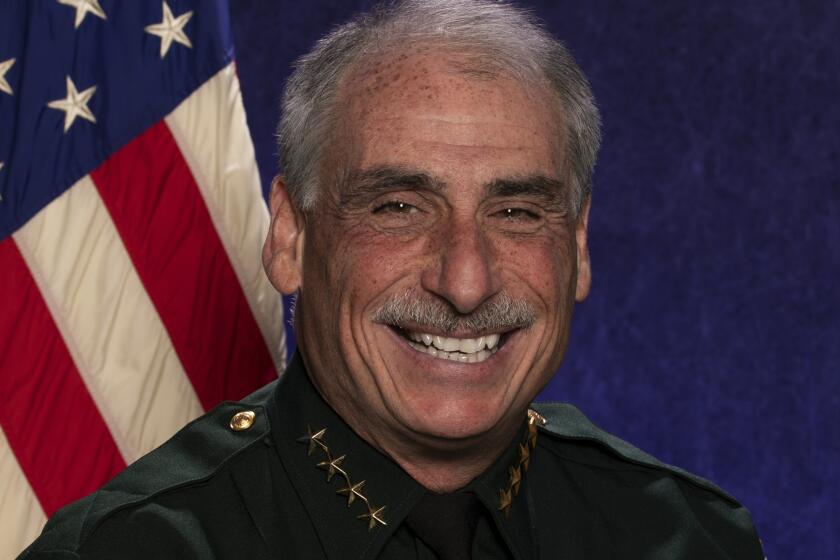Hitting Hussein: Would It End War?
U.S. intelligence officials said they believe that Iraqi President Saddam Hussein and his two grown sons were in the compound hit in predawn airstrikes Thursday in Baghdad, but it is not clear whether any of them were killed.
The disclosure offered one clue to why the U.S. military continued to refrain from a full-scale attack, with Pentagon officials saying that the Iraqi military appeared adrift and that it remained possible full-scale war could be avoided.
Senior U.S. and military intelligence officials were cautious in their assessments, and Defense Secretary Donald H. Rumsfeld said the military is still poised to unleash a massive assault.
But officials say they are benefiting from a surge of intelligence from Iraqi sources, and a key member of Congress said the information placing Hussein and his sons at the targeted site early Thursday came from people inside Iraq.
Officials were clearly hoping that the strike on a residential compound on the outskirts of Baghdad might have delivered a fatal blow to Hussein’s regime.
“We believe he was there. We believe both sons were there,” said a U.S. intelligence official. Asked whether there was any evidence Hussein had died, the official said, “I know it’s dissatisfying, but we don’t know yet.”
Another senior U.S. intelligence official said he expected that the agency would know within days whether Hussein or his sons, Uday and Qusai, were injured or killed.
He said that the United States does not have people in position to visit the site but that the crater is being examined by satellite, and that the United States is closely monitoring Iraqi communications networks for chatter about Hussein’s fate.
But some intelligence experts expressed doubt that Hussein or his sons were killed, saying other senior Iraqi officials probably would have come forward by now to deliver the news.
CIA officials also continued to analyze Hussein’s appearance on Iraqi television shortly after the attacks to determine whether the man on the screen was the dictator or an impostor, and whether the appearance might have been on tape instead of live.
Thursday’s events underscored the extent to which a war the United States choreographed for nearly a year is proceeding along a surprising stop-and-go course.
Although the U.S. military bombed more targets in Baghdad, and U.S. forces poured across the Iraqi border from Kuwait, senior Pentagon officials said they were pursuing a last-ditch effort to avoid full-scale war.
“Combat is our last choice,” one Pentagon official said. “And if you can tip the balance without a full-scale operation, don’t you owe it to your country to do that?”
The official said the Pentagon has stepped up its campaign to persuade Iraqi forces to surrender and the Iraqi people to avoid resisting U.S. forces.
“We have shifted to a very, very robust psy-ops [psychological operations] campaign,” the official said. “The message continues to be to surrender.”
In a Pentagon briefing, Rumsfeld repeatedly appealed to Iraqi military leaders to give up and said there is “broad and deep evidence” of military officers being ready to help or lay down their arms.”
“There are communications in every conceivable mode and method, public and private,” including with the Republican Guards, Rumsfeld said Thursday night after meeting with lawmakers. Rumsfeld also issued a strongly worded warning that the United States remains poised to deliver a devastating full-scale attack.
If and when full-scale operations begin, Rumsfeld said, they “will be of a force, a scope and a scale that is beyond what has been seen before.”
Pentagon officials did not say whether those plans had been put on hold because of uncertainty about Hussein’s fate. But military officials have said in recent days that a direct hit on Hussein could bring a quick end to the war.
Thursday’s strike targeted what intelligence officials described as a residential compound on the outskirts of Baghdad. One official described it as a “big site” inside a walled-off area containing several buildings. He said there was a bunker under one of the structures.
Dozens of Tomahawk missiles were launched during the strikes, and F-117 Nighthawk stealth aircraft dropped 2,000-pound, bunker-busting bombs.
Sen. Pat Roberts (R-Kan.), chairman of the Senate Intelligence Committee, said the strike was based on intelligence from human sources. That indicates the CIA or an allied intelligence agency could have spies inside Baghdad.
If so, it would represent a breakthrough in an intelligence effort that has struggled for years to obtain information on Hussein’s whereabouts.
Several intelligence officials said the massive U.S. military buildup and psychological operations have dramatically expanded the flow of information from Iraq in recent months.
“People think we’re serious,” said a government official familiar with intelligence on Iraq. “It makes it much more likely for people to stick their necks out.”
Asked whether the CIA has gained new traction in Iraq, Roberts said, “I don’t think there’s any question.” He said the intelligence from inside Iraq was near “zero” a few years ago and has improved substantially.
If Hussein survived the attack, intelligence officials said they hoped the Iraqi leader would be rattled.
Hussein “has to start thinking, ‘How did they know this and who is telling them?’ ” said one military intelligence official.
The objective, the official said, is to make Hussein “even more paranoid than he has already been.”
Hussein is known to execute even longtime loyalists on mere suspicion of betrayal.
“If that starts, you’re going to see others [close to him] saying, ‘I don’t need to hang around to be next,’ ” the military intelligence official said.
If the attack was based on human intelligence, as opposed to electronic intercepts or other techniques, former CIA officers said, it doesn’t necessarily mean that the agency has a spy inside Hussein’s inner circle.
More likely, former officials said, the agency is getting information from Iraqis on the periphery of Hussein’s regime, perhaps from sources in his vast security services. Or it could mean the CIA has agents serving as spotters in Baghdad, watching for movements of convoys or activity at key compounds.
CIA Director George J. Tenet and others have said the United States is getting significant cooperation from other countries’ spy agencies.
During his presentation of intelligence at the United Nations recently, Secretary of State Colin L. Powell used contributions from about 10 other countries that spy on Iraq.
Officials said the agency has also made a major push in recent months to collect information from Iraqi agents and diplomatic officials around the world.
The State Department recently asked 60 countries to expel alleged Iraqi agents. One intelligence source said the Iraqis were given a choice of revealing information or being dispatched back to Baghdad -- perhaps for pending war crimes trials, perhaps in time for the bombing.
Former CIA officials said the agency is undoubtedly working with the U.S. military in a major push to contact Iraqi military and government officials, urging them to switch sides.
“We probably know the telephone numbers of lots and lots of these people,” said the source, a former high-ranking official in the agency’s clandestine service. “I’m sure we have called them up.”
The United States can also break into Iraqi radio systems and military communications networks. Pentagon officials acknowledge that psychological operations units have also bombarded Iraqi military officials with e-mail.
*
Times staff writers Esther Schrader and John Hendren contributed to this report.
More to Read
Sign up for Essential California
The most important California stories and recommendations in your inbox every morning.
You may occasionally receive promotional content from the Los Angeles Times.











